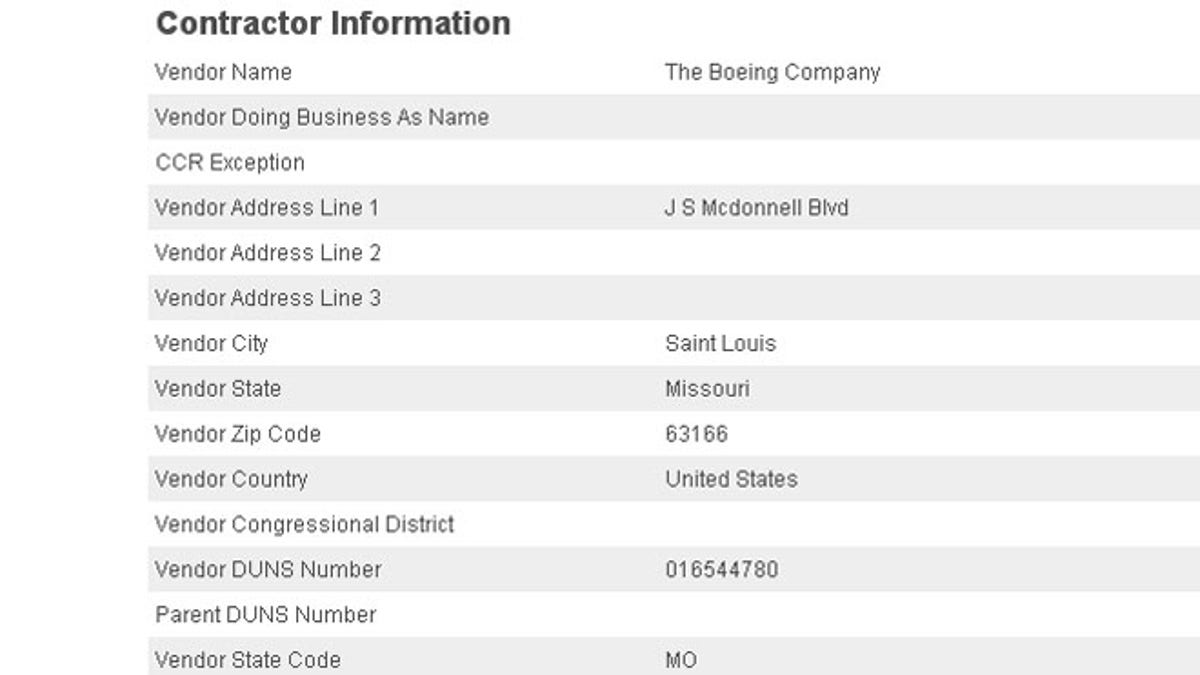
Shown here is federal contractor information for Boeing. The so-called DUNS number is at the bottom. (USASpending.gov)
The federal government is looking to break the stranglehold one company has on the use of -- numbers.
Uncle Sam is currently spending millions of dollars on a contract with Dun & Bradstreet, which runs a database that assigns numbers to other contractors. The growing cost of that program was documented last week in a letter from the Government Accountability Office to Sen. Ben Nelson, D-Neb. The office found the government is now spending roughly $19 million a year on the system that cost just $1 million annually one decade ago.
What's the point of this system? The government handles more than $1 trillion a year in contracts and grants. Washington needs to assign a unique number to each one of them, to track all the businesses and other entities it deals with. For more than three decades, it has turned to one company -- Dun & Bradstreet -- for its numbering needs.
But over the years, various government dictates have expanded the use of that system, and it's grown to include other information like business names, addresses and ownership details.
As a result, costs have skyrocketed. So the government, after years of watching those costs rise, is finally starting to consider an alternative -- amid concern that Dun & Bradstreet's domination of the numbering market has driven up costs.
"GSA believes that Dun & Bradstreet effectively has a monopoly for government unique identifiers that has contributed to higher costs," GAO wrote in its letter to Nelson. GSA, or the General Services Administration, manages the contract.
The rising price-tag of the mundane system is emblematic of the struggle Washington has faced to control costs across its bureaucracy at a time of gaping deficits.
Even the system the government uses to track what it's spending money on is costing a lot of money.
Over the years, the database has become rather unwieldy thanks in part to the government's own rules. The so-called DUNS system assigns a simple nine-digit number not just to every business the government works with, but in some cases every branch and division of every business. The number, for instance, for Boeing in St. Louis, is 016544780.
One contractor database, according to the GAO, includes 625,000 entities -- each with its own registered number.
A spokeswoman for Dun & Bradstreet defended the company's work Monday. She said the rising costs are tied to "expanding scope and requirements as directed by the government over the past decade."
"D&B has been a critical team member in helping the government meet their mission objectives which includes entity management, transparency and accountability," she said.
The spokeswoman also said "there is no legal or other basis that would support any claim of monopoly in this situation."
"Our partnership with the General Services Administration (GSA) enables D&B to provide a vast array of data, software, and services in a cost-effective, flexible manner to meet evolving government-wide priorities. We always seek to be responsive to our customers' unique requirements, consistent with our strong heritage, market-leading solutions and high standards of customer service," she said.
The Dun & Bradstreet contract now is worth up to $154 million, for a three-year period with the option of five additional years.
Washington is currently trying to figure out how to bring costs back under control -- namely by switching to a "government-owned numbering system."
However, doing so could come with "prohibitively high" costs for switching over, GAO warned. The office suggested GSA continue to use the so-called DUNS system for the short-term while phasing in a government-owned system -- and said GSA was considering it.




